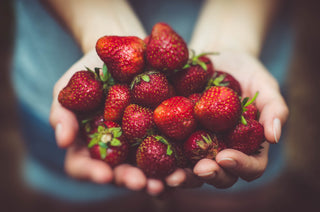We care so much about how we look and dress, but how about what we put into our body? Did you know that the quality of the ingredients you consume directly affects how you feel, and look?
Why organic?
Certain veggies and fruits contain so many chemicals and pesticides from traditional farming that it could be more harmful than helpful for your body. In 2021, “the USDA’s tests found residues of potentially harmful chemical pesticides on nearly 70 percent of the non-organic fresh produce sold in the U.S.”1
Organic standards prohibit the use of synthetic pesticides, among other things. Eating organic food reduces pesticide exposure and is linked to many health benefits, according to an article published this year in the peer-reviewed journal Nutrients.2
What are the benefits of organic produce consumption?
In four separate clinical trials, people who switched from conventionally grown to organic foods saw a rapid and dramatic reduction in their urinary pesticide concentrations, a marker of pesticide exposure. Additional studies have linked higher consumption of organic foods to lower urinary pesticide levels, improved fertility and birth outcomes, reduced incidence of non-Hodgkin’s lymphoma, lower BMI and reduced risk of Type 2 diabetes.3
With rising organic prices, how do we decide whether to buy organic produce and not?
Look for the dirty dozen according to EWG which are the veggies and fruits that have the most contaminants.
Here they are:
- Strawberries.
- Spinach.
- Kale, collard and mustard greens.
- Nectarines.
- Apples.
- Grapes.
- Cherries.
- Peaches.
- Pears
- Bell and hot peppers
- Celery
- Tomatoes
The general rule of thumb is if you’re directly consuming a fruit or vegetable with thin skin, or with skin, you go organic. For instance when it comes to lemons, watermelon, avocado, oranges, etc, you’re free to go with traditional produce as long as you don’t consume the skin.
Here are the 15 clean produce items according to USDA-provided data:
- Avocados
- Sweet corn
- Pineapple
- Onions
- Papaya
- Sweet peas (frozen)
- Eggplant
- Asparagus
- Broccoli
- Cabbage
- Kiwi
- Cauliflower
- Mushrooms
- Honeydew melon
- Cantaloupes
When we first discovered how much toxic ingredients are in our daily life, we made a commitment at DreamRise to only provide the least processed and most clean ingredients.
Will you join us on the path to feeling good inside and outside?
Photo by Unsplash Artur Rutkowski.
1https://www.ewg.org/foodnews/summary.php

